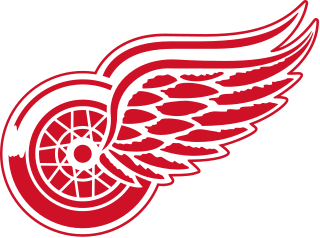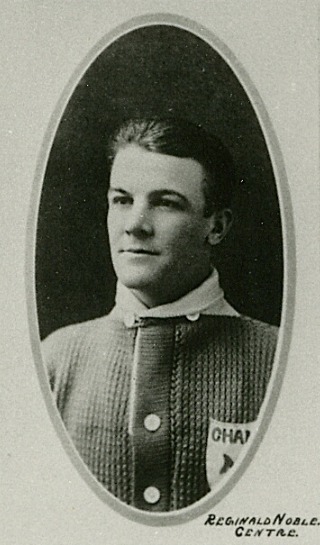
The Detroit Red Wings are a professional ice hockey team based in Detroit. The Red Wings compete in the National Hockey League (NHL) as a member of the Atlantic Division in the Eastern Conference, and are one of the Original Six teams of the league. Founded in 1926, the team was known as the Detroit Cougars until 1930. For the next two seasons, the team was named the Detroit Falcons, before changing their name to the Red Wings in 1932.

John James Adams was a Canadian professional ice hockey player, coach and general manager in the National Hockey League and Pacific Coast Hockey Association. He played for the Toronto Arenas, Vancouver Millionaires, Toronto St. Patricks and Ottawa Senators between 1917 and 1927. He won the Stanley Cup twice as a player, with Toronto in 1918 and Ottawa in 1927, and was inducted into the Hockey Hall of Fame.

The Victoria Cougars were a major league professional ice hockey team that played in the Pacific Coast Hockey Association (PCHA) from 1911 to 1924 under various names, and in the Western Hockey League (WHL) from 1924 to 1926. The team was based in Victoria, British Columbia and won the Stanley Cup in 1925, becoming the final non-NHL team to win the Cup.
The 1926–27 NHL season was the tenth season of the National Hockey League. The success of the Boston Bruins and the Pittsburgh Pirates led the NHL to expand further within the United States. The league added three new teams: the Chicago Black Hawks, Detroit Cougars, and New York Rangers, to make a total of ten, split in two divisions. This resulted in teams based in Canada being in the minority for the first time. To stock the teams with players the new teams brought in players from the Western Hockey League, which folded in May 1926. This left the NHL in sole possession of hockey's top players, as well as sole control of hockey's top trophy, the Stanley Cup, which was won by the Ottawa Senators. This was the original Senators' eleventh and final Stanley Cup win. The Senators' first was in 1903.

Detroit Olympia, also known as Olympia Stadium, was a multi-purpose arena in Detroit. Nicknamed "The Old Red Barn", it was best known as the home of the Detroit Red Wings of the National Hockey League (NHL) from its opening in 1927 to 1979.

Edward Reginald Noble was a Canadian professional ice hockey forward and defenceman who played 17 professional seasons in the National Hockey Association (NHA) and National Hockey League (NHL) for the Toronto Blueshirts, Montreal Canadiens, Toronto St. Pats, Montreal Maroons, Detroit Cougars, Detroit Falcons and Detroit Red Wings between 1916 and 1933. He was a three-time winner of the Stanley Cup, with Toronto and Montreal and was inducted into the Hockey Hall of Fame in 1962. He was also the last active player from the NHL's inaugural season, the NHA and the 1910s.

Ebenezer "Poker Face" Robertson Goodfellow was a Canadian professional ice hockey player and coach. Goodfellow played in the National Hockey League (NHL) for fourteen seasons with the Detroit Red Wings from 1929 to 1944 as both a forward and defenceman. Goodfellow helped the Red Wings win three Stanley Cups, back to back in 1935–36 and 1936–37, and another in 1942–43. He was captain of the Wings for five seasons, including winning the first Red Wings MVP as a defenseman in 1939-40. He played on the team until 1942 when he was succeeded by Syd Howe as team captain. Goodfellow was the first Red Wing to have won the NHL's Hart Trophy (MVP) for the 1939–40 season. Goodfellow was the first Red Wing to receive this award and one of only four Red Wings in history to win the Hart; the other three being six-time winner Gordie Howe, Sid Abel (1949) and Sergei Fedorov (1994). After retiring from playing, Goodfellow coached in the American Hockey League (AHL) and later with the Chicago Black Hawks of the NHL.
The 1932–33 NHL season was the 16th season of the National Hockey League (NHL). Nine teams each played 48 games. The New York Rangers beat the Toronto Maple Leafs three games to one for the Stanley Cup.
The 1929–30 NHL season was the 13th season of the National Hockey League. Ten teams played 44 games each. The Montreal Canadiens upset the heavily favoured Boston Bruins two games to none in the Stanley Cup Finals.
The 1935–36 NHL season was the 19th season of the National Hockey League (NHL). The St. Louis Eagles dropped out of the league, leaving eight teams. The Detroit Red Wings were the Stanley Cup winners as they beat the Toronto Maple Leafs three games to one in the Stanley Cup Finals.
Lawrence Henry "Little Dempsey" Aurie was a Canadian professional ice hockey right winger who played 11 seasons in the National Hockey League for the Detroit Cougars, Detroit Falcons and Detroit Red Wings.
The NHL's American Division was formed after expansion in 1926. The division existed for 12 seasons until 1938.
The 1926–27 Detroit Cougars season was the first season of National Hockey League (NHL) hockey in Detroit, Michigan. The Detroit Cougars scored 28 points, finished at the bottom of the American Division as well as the league and failed to make the playoffs in their inaugural year.
The 1927–28 Detroit Cougars season was the second season of the Detroit, Michigan National Hockey League (NHL) franchise later known as the Detroit Red Wings. The Detroit Cougars scored 44 points, finishing fourth in the American Division and failing to make the playoffs in their sophomore year.
The history of the Detroit Red Wings begins in 1926, when the franchise began play in the National Hockey League (NHL). The professional ice hockey club was founded as the Detroit Cougars on September 25, 1926, one of three teams to join the NHL in 1926. With the demise of the Western Canada Hockey League (WCHL), the rights to the players of the Victoria Cougars were purchased by a Detroit group led by Charles A. Hughes who kept the name "Cougars" for their NHL club. The new team struggled financially; in 1930, the Cougars changed their name to the Detroit Falcons, and after being bought out of receivership by James E. Norris were renamed as the Detroit Red Wings in 1932. The team played their first game on November 18, 1926, and won their first two Stanley Cup titles in 1936 and 1937. The Red Wings have won the Cup eleven times, more than any other American team in NHL history.
The Blackhawks–Red Wings rivalry is a historic rivalry in the National Hockey League (NHL) between the Chicago Blackhawks and Detroit Red Wings. Prior to the 2013–14 league-wide divisional realignment, it was the most intense rivalry in the Central Division during the post-lockout era. They represent the two largest metro areas in the Midwest and are only separated by a 280-mile stretch of road, mostly covered by I-94. The clubs began playing each other in 1926–27, during the inaugural season for both franchises. These two clubs have faced each other in more regular season games than any other two teams in NHL history, only the Bruins–Canadiens rivalry exceeds them in total games played when Stanley Cup playoff games are included.





